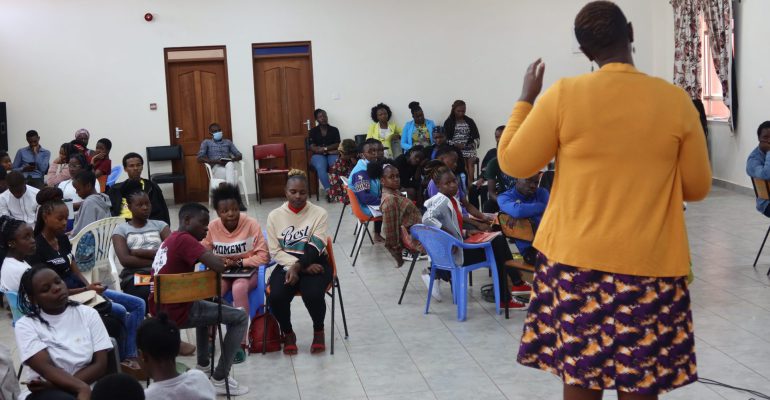In this AJANews Newsletter, November issue, the African Jesuit AIDS Network (AJAN) marks International Children’s Day observed on November 20, 2023. This day was founded in 1954 with the goals of advancing awareness, bolstering support for the fundamental rights of children and adolescents, and strengthening the bond between nations in the pursuit of bettering their well-being.
This year’s theme, “For every child, every right”, reminds us that all children have unalienable rights, regardless of who they are, where they are, or how they got there. For the full and harmonious development of a child’s personality, he or she should grow up in a family environment, in an atmosphere of happiness, love and understanding. Pope Francis reminds us that, “too often we forget our responsibility and close our eyes to the exploitation of these children, who do not have the right to play, to study, or to dream.” He is always emphasizing how “every marginalized child, without education, without health care, and abandoned by its family, is a cry!” A cry for help that speaks to God.
According to the UNAIDS Global report, in 2022, an alarming 1.5 million children (aged 0-14) are living with HIV, with only 57% receiving antiretroviral therapy. Nearly half of all new HIV infections are in 11 African nations. Listening to this cry, the African Jesuit AIDS Network (AJAN), believes that for every child living with HIV to enjoy every right, we must intensify our efforts to identify, screen for, and treat HIV-positive children to stop the AIDS epidemic.
For our vulnerable children in Africa who live in deplorable conditions subjected to various exploitation because of poverty, there is a need to see how we can safeguard them by protecting, cherishing, uplifting, and securing their future. It is reported by ILO (International Organization of Work) that children are among the most oppressed groups who are affected deeply by the decisions and actions of the adults around them. The infringement of fundamental rights for the future of minors, namely the right to education, is closely associated with various issues such as forced displacement due to climate change, child labor, early marriages, and conflicts. 771 million adults worldwide—of whom 55% are young people between the ages of 15 and 24—and 262 million children and young people lack access to basic education and are illiterate, according to UNESCO.
In a report published by UNICEF, The Convention on the Rights of the Child at a Crossroads, recommends adding more data and evidence, scaling up interventions and solutions that have been shown to work, increasing resources, involving youth in the co-creation of solutions, implementing equity and gender equality principles in programming, and tackling stagnation and backsliding in certain areas of child rights in order to accelerate progress toward these goals. It also acknowledges that, although these components are essential for bringing about change, new approaches are also needed considering the quickly evolving global landscape in order to properly reintegrate children’s rights as a worldwide cause and address new opportunities and challenges.
The right to protect our children also means that we take precautions steps by providing easier access to treatment for diseases such as Tuberculosis (TB). The world needs to embrace choice if we are to meet the globally agreed-upon goal of reducing TB deaths by 90 percent by 2030 – referred to as the “End TB targets.” The urgency of the need is clear, as according to the latest released data of the Global Tuberculosis Report by WHO, an estimated 1.6 million people lost their lives to the disease in 2021, the second consecutive year the death toll went up after 14 years of progress. In Africa, an estimated 2.5 million people contracted the disease in 2021, one million of these unfortunately were never diagnosed and treated. It is good to note that the disease continues to be the leading killer among people with HIV.
We continue to work with our benefactors and volunteers, collaborating with various partners in exchanging best practices that empower our children to guarantee their safety and well-being in Africa. Inside this issue we are excited to share with you, our reader, the report and firsthand accounts of the AJAN HIV and AIDS Programme for the Youth (AHAPPY) Training of Trainers (ToT) conducted in Burkina Faso by the Association les Bénévoles de l’Espérance (ABE) in partnership with AJAN team. This is another way of expanding the AJAN team engaged in fighting ignorance among the youth and preparing the future by equipping children, adolescents and young adults to choose wisely and live a principled life that protects them from any external destructive force, including risky behavior.
Par, Dennis Owuoche,
Chargée de communication, AJAN


Comments are closed.